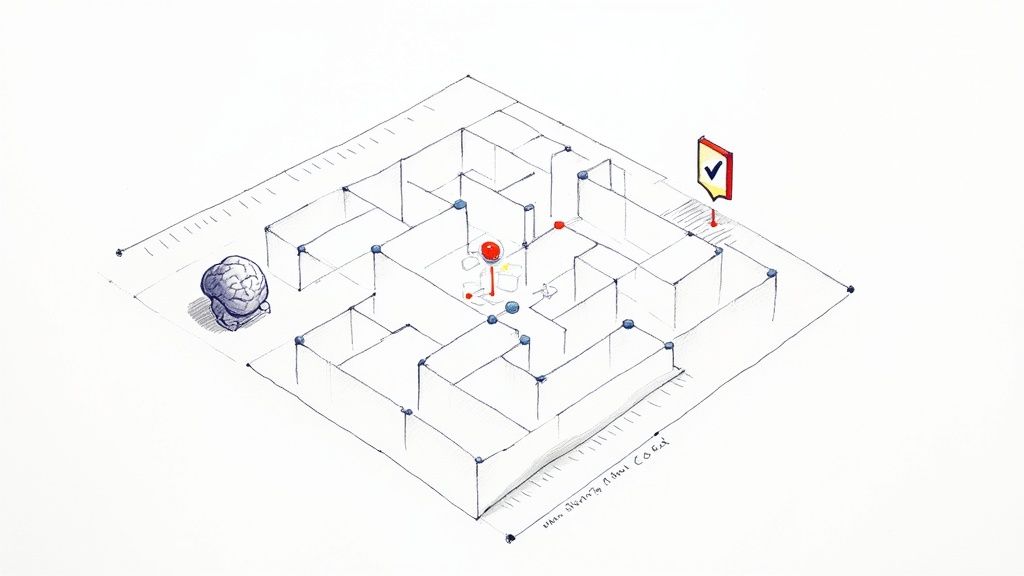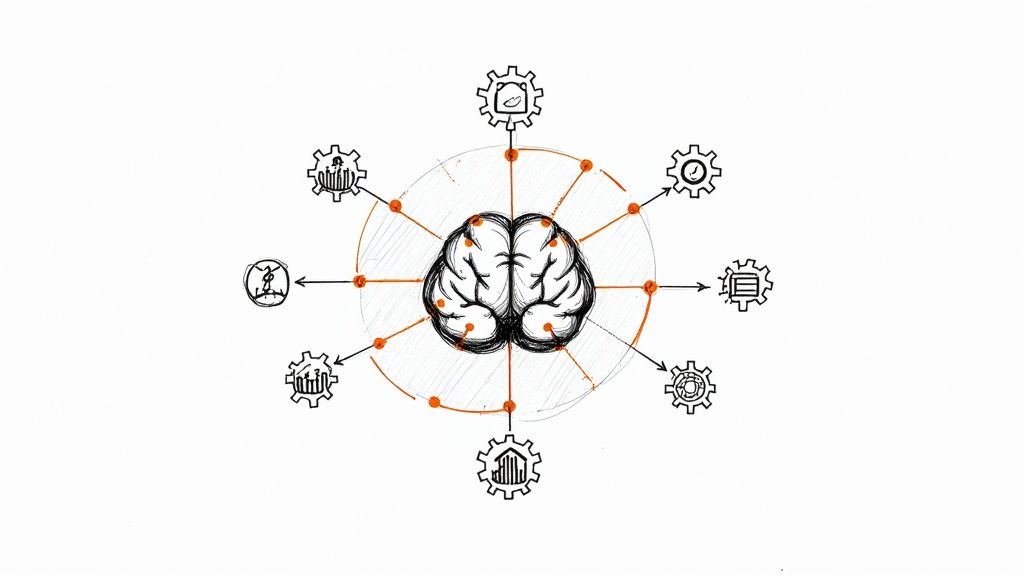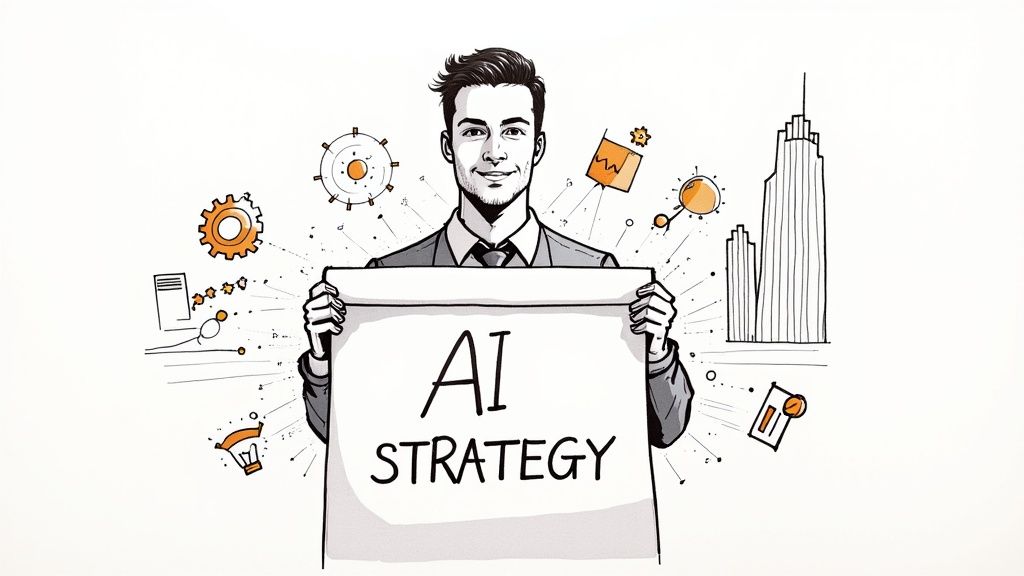Generative AI Consulting That Drives Business Growth
Discover how generative AI consulting can transform your business. Learn to build a strategy, implement solutions, and choose the right partner for real growth.

Beyond all the headlines and hype, business leaders are asking the same simple question: How do we actually turn generative AI into real-world business value?
The answer, more often than not, is generative AI consulting. Think of it as the essential bridge between knowing AI could do something for you and actually making it happen for a real competitive advantage. It’s the strategic guidance that turns a complex, powerful technology into a tangible engine for growth.
Why Generative AI Consulting Is Your Strategic Advantage
The market for generative AI is absolutely exploding. We’re looking at a jump from an estimated $25.86 billion in 2024 to a staggering $1005.07 billion by 2034. That incredible number tells a story: companies are rushing to adopt AI to automate work and sharpen their operations. You can dive deeper into these growth projections from Precedence Research.
This kind of rapid growth opens up massive opportunities, but it’s also a huge challenge. Plenty of organizations see the potential, but they get stuck trying to move from a theoretical idea to a practical, working application. This is precisely where generative AI consulting creates a powerful advantage.
It's like the difference between knowing the rules of chess and having a Grandmaster sitting next to you, planning your moves. A great consultant doesn’t just hand you a piece of technology; they give you a clear roadmap, deep expertise, and a true partnership.
Bridging The Gap Between Idea and Impact

The real value of a consultant is their ability to translate what AI can do into a solution that fixes one of your specific business problems. They help you cut through the complexity of implementation, making sure your investment actually produces a measurable return.
This approach is best described as AI co creation, where your team’s deep knowledge of your business is fused with the consultant’s external expertise. This collaborative model ensures the final solution is a perfect fit for your company’s unique goals, culture, and day-to-day realities.
Let’s break down exactly how this partnership delivers tangible value across the most critical stages of an AI initiative.
How Generative AI Consulting Delivers Tangible Value
This table shows how a consulting partner turns broad AI potential into specific, valuable business outcomes.
Consulting Area
Business Value and Outcome
Strategy & Vision
Develops a clear, actionable AI roadmap that aligns directly with your most critical business objectives.
Use Case Identification
Pinpoints high-impact, low-risk opportunities to apply AI for maximum and immediate ROI.
Technology Selection
Navigates the complex vendor landscape to choose the right tools and platforms for your specific needs.
Risk & Governance
Establishes frameworks for ethical AI use, data privacy, and regulatory compliance to protect your business.
Change Management
Prepares your teams for new AI-powered workflows, ensuring smooth adoption and minimizing disruption.
Long-Term Scaling
Builds a foundation that allows your AI capabilities to grow and evolve with your business over time.
By tackling each of these crucial areas, generative AI consulting demystifies the entire process. It transforms what feels like an intimidating technological shift into a manageable—and highly rewarding—strategic project.
Ultimately, it ensures you’re not just adopting AI, but actually mastering it.
What a Generative AI Consultant Really Does

Let's cut through the buzzwords and get to what a generative AI consultant actually does. Forget the idea of a tech guru who just talks about algorithms. Think of them as a translator and an architect, someone who designs a practical blueprint for weaving AI into the real world of your business.
A good consultant isn't just another vendor trying to sell you a product. They’re a strategic partner who needs to be just as fluent in your business challenges as they are in the latest AI models. This combination is crucial because great AI projects are never about the tech alone; they’re about solving a problem that matters to your bottom line.
More Than a Tech Expert—A Strategic Partner
The best generative AI consulting partnerships are laser-focused on results, not just reports or recommendations. A consultant’s real value is in their ability to draw a straight line from a powerful AI tool directly to one of your most important business goals.
To do this, they need to be experts in three distinct areas:
- Business Strategy: They have to start by digging into your market, understanding your competition, and knowing what your growth targets are. This is the only way to make sure an AI project is set up to solve a genuine problem or capture a real opportunity.
- Technical Proficiency: Of course, they need deep knowledge of different AI models, data pipelines, and what it takes to get everything working together. They can guide you through the maze of technical choices, saving you from expensive dead ends.
- Change Management: They understand that new technology changes how people work. A huge part of their job is helping your team adapt, making sure the new tools are actually embraced and used, not just installed and ignored.
This well-rounded approach is the core of effective AI strategy consulting. It makes sure the technology works for your mission, not the other way around.
The Architect of Your AI Blueprint
A generative AI consultant is a lot like an architect. Before a single brick is laid, an architect has to understand the purpose of the building, who will use it, and the environment around it. In the same way, a consultant's first job is to listen and learn about your business.
An AI consultant’s primary role is to bridge the gap between AI’s potential and its practical implementation. They translate complex technical capabilities into clear business value, ensuring every project is grounded in strategic purpose.
This process starts with a deep dive into your operations. They conduct a thorough AI requirements analysis to nail down the exact problem you want to solve. From there, they help you pinpoint high-impact, achievable real-world use cases that can deliver quick wins and build excitement across the company.
In the end, their job is to hand you a clear, actionable plan. This isn't just a list of tools; it’s a roadmap that outlines the steps, people, and timeline needed to get it done right. When you work with our expert team, you get more than just a consultant—you get a dedicated guide for your entire AI journey.
Building Your AI Strategy From the Ground Up
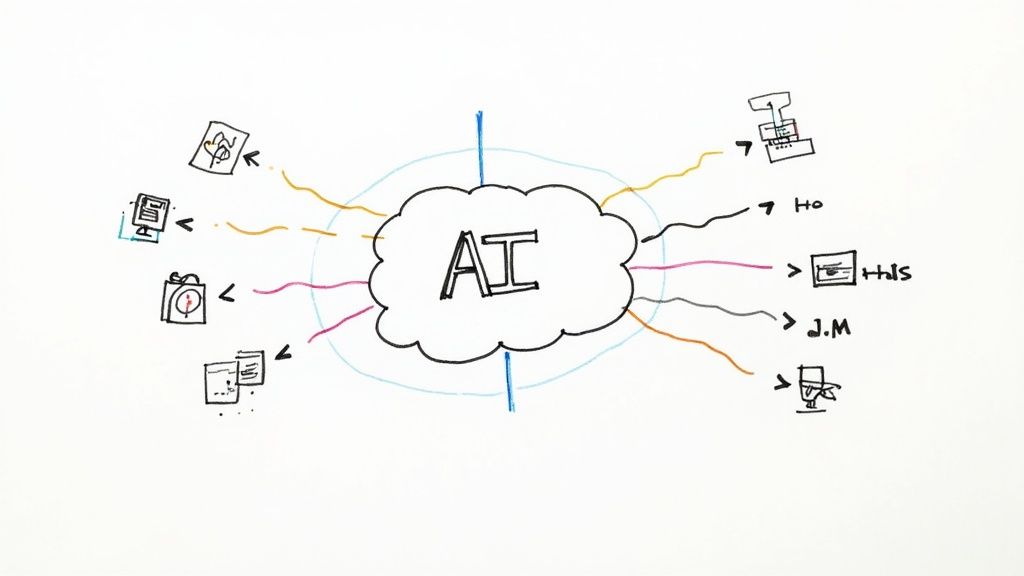
Powerful AI isn’t just about having the latest tech; it's about having a smart plan. Diving into generative AI without a clear strategy is a recipe for wasted resources. It’s like setting sail without a map—you might be moving, but you have no idea where you're going. The most successful AI projects are always built on a solid foundation, where every decision is tied directly to a specific business goal.
This is exactly where generative AI consulting comes in. A good partner helps you look past the hype to define what success actually looks like for your company. They walk you through the crucial planning stages to ensure your investment pays off, turning AI from a cool experiment into a core part of how you operate.
The demand for this kind of strategic guidance is exploding. The global AI consulting market is projected to skyrocket from $11.07 billion in 2025 to a staggering $90.99 billion by 2035. That's a compound annual growth rate of 26.2%, a clear sign that businesses are realizing they need expert partners to get AI right. You can dig into this trend further with the full report from Future Market Insights.
Discovery and Assessment
You can't plan a journey without knowing your starting point. The first step, discovery and assessment, is a deep dive into your organization to figure out where AI can make a difference and what might get in the way.
A consultant will typically analyze a few key areas:
- Business Processes: They'll map out your current workflows to spot the inefficiencies and bottlenecks where AI could have the biggest impact.
- Data Readiness: Your data is the fuel for any AI model. Is it clean, accessible, and secure enough to do the job?
- Technical Infrastructure: Does your current tech stack have what it takes to support new AI tools?
- Organizational Skills: Are there skill gaps in your team that need to be filled through training or new hires?
This honest audit gives you the clear-eyed view you need to build a plan that’s both ambitious and realistic.
Use Case Identification
With a solid understanding of your business, it’s time to pinpoint the best opportunities. Not all AI projects are created equal. The real goal is to find the sweet spot: projects that deliver serious business value but are also technically doable without taking on massive risk. It’s a collaborative process of brainstorming and prioritizing to find the quick wins and long-term game-changers.
This means asking some tough questions:
- Which problems, if we solved them, would move the needle most on revenue, costs, or customer happiness?
- Where can we launch a pilot project to prove the concept quickly and build some momentum?
- How do these potential projects line up with our bigger, long-term business goals?
This keeps you from getting distracted by shiny new toys that don't actually solve a real problem.
Technology Selection and Governance
Once you know what you want to do, you can figure out how to do it. Choosing the right tech stack is a massive decision that will shape your AI capabilities for years. A consultant can offer an objective, expert eye, helping you pick the tools that fit your unique needs and budget instead of pushing a one-size-fits-all solution.
Governance isn't a barrier to innovation; it's the guardrails that make innovation safe and scalable. A strong governance plan ensures your AI is ethical, compliant, and trustworthy from day one.
Just as important is setting up a solid governance framework. This means creating clear rules for how AI is built, deployed, and monitored. It tackles the big stuff—data privacy, ethical use, and regulatory compliance—making sure your AI initiatives are responsible and secure from the start.
For leaders ready to design their own plan, our comprehensive AI strategy framework provides the definitive guide for taking these critical next steps with confidence.
Turning Your AI Vision into a Reality
A brilliant strategy is a great starting point, but let's be honest—it’s just a document until you put it into action. Execution is where the real value gets created. I’ve seen far too many businesses draft an impressive AI plan only to see it stall out during implementation. This is where we bridge that gap, laying out a clear, manageable roadmap to take your generative AI vision and turn it into something that measurably impacts your business.
The trick is to avoid a big-bang, high-risk launch. Instead, you want to start with a high-value, low-risk pilot project. It's all about building momentum, proving the ROI to the people holding the purse strings, and getting your team genuinely excited. Secure one early win, and you’ll pave the way for much bigger, more ambitious projects down the road.
Starting with a High-Impact Pilot Project
The journey starts with picking the right first project. A generative AI consulting partner can be invaluable here, helping you pinpoint a pilot that solves a real, tangible problem without demanding a massive upfront investment. The goal is to show value quickly and learn from a contained, real-world test.
To make sure your pilot succeeds, you have to define its scope with laser precision. Getting everyone aligned from day one is non-negotiable.
The Implementation Roadmap: A Step-by-Step Guide
Once you’ve locked in your pilot project, the implementation follows a structured path. Think of this roadmap as breaking down a complex deployment into distinct, manageable stages, each with its own goals and challenges.
This visual shows the essential flow, from figuring out what the business needs all the way to deployment and ongoing improvements.
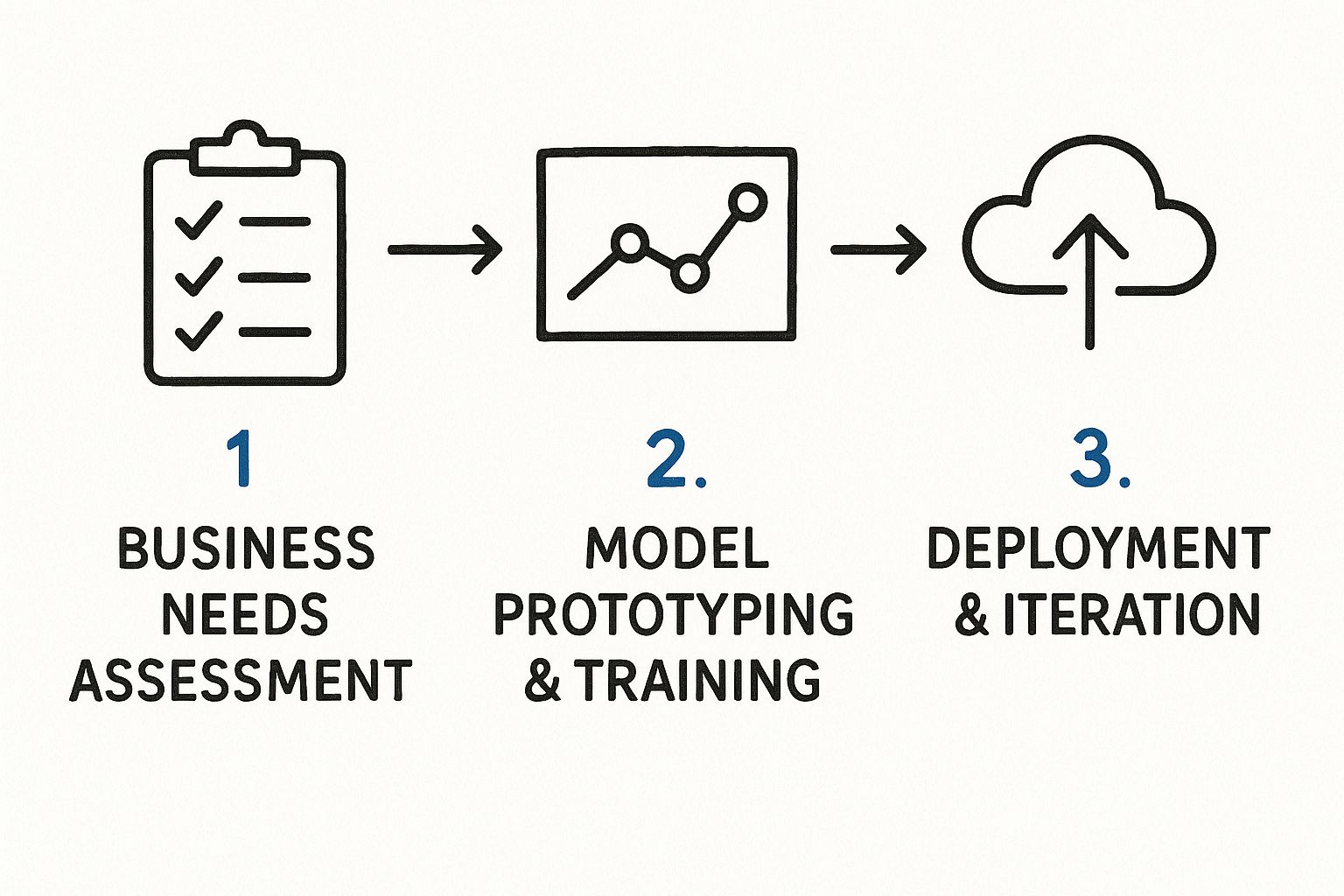
What this really shows is that a successful AI project isn't a "one and done" event. It's a continuous cycle of improvement, fed by real-world feedback.
Let's break down what happens in each phase:
- Data Preparation and Curation: Your data is the fuel for any generative AI model. This stage is all about gathering, cleaning, and securing the right datasets. It’s a foundational step, and you can’t skimp on it. One study found that 93% of Chief Data Officers know a data strategy is vital, but many just don't have a solid plan. A consultant makes sure your data is high-quality and ready to produce accurate, reliable AI outputs.
- Model Selection and Training: With clean data in hand, the next move is to choose and train the right AI model. This might mean fine-tuning an existing foundation model or, in some cases, developing a custom solution from the ground up. The key is to pick an approach that perfectly matches your specific use case, budget, and in-house technical skills.
- System Integration and Testing: The new AI solution can’t live on an island; it has to fit smoothly into your existing software and workflows. This phase is about connecting the AI model to your current systems, usually via APIs, to ensure data flows seamlessly. After that comes rigorous testing to check its performance, security, and the overall user experience before anyone in your company actually touches it.
- Deployment and Scaling: Once the testing is complete and everyone gives the green light, the pilot is rolled out to a small, select group of users. We gather their feedback to make final tweaks. After the pilot proves its value, we create a plan to scale the solution across the organization, using everything we learned to make future AI projects even better. Having expert AI implementation support during this whole process is absolutely critical for getting past the inevitable technical hurdles.
Tackling challenges like data privacy and user adoption head-on is non-negotiable. A successful implementation plan includes proactive strategies for governance and change management to ensure the technology is used responsibly and embraced by your team.
How To Choose The Right AI Consulting Partner
Picking the right generative AI consulting partner might be the single most important decision you make on this entire journey. This isn't just about hiring a contractor; it's about finding a co-pilot who understands where your business needs to go and can help you navigate the complex tech to get there. The market is flooded with options, so you have to look past the slick sales decks and figure out what really matters.
The explosive growth in this space has brought everyone to the party. The combined market for generative AI software and services rocketed from just $191 million in 2022 to a massive $25.6 billion in 2024. That thousandfold jump shows just how fast companies are jumping in, but it also means you need to be careful to find a truly skilled partner among the crowd. You can find out more about this rapid market expansion and what it means for businesses.
Beyond Technical Skills
Let's be clear: deep technical know-how is table stakes. But it’s not nearly enough. A great partner also needs serious business acumen. They have to speak the language of your industry, get your competitive pressures, and understand the real-world challenges your teams face every day. Without that context, even the most sophisticated AI model is just a fancy solution looking for a problem.
The best firms act as translators, turning complex technical jargon into practical business strategy. Their team should be able to switch gears from a conversation about fine-tuning an LLM to one about hitting your quarterly revenue targets.
The right partner doesn't just build you a tool; they build a bridge between the technology's potential and your business's reality. They ensure every line of code serves a strategic purpose.
This all-in-one approach is the heart of a successful AI co creation partnership, where tech skills are matched with a genuine, empathetic understanding of what you're trying to achieve.
A Collaborative and Transparent Approach
Real partnership is built on collaboration and transparency. Steer clear of any firm that offers "black box" solutions or is vague about its process. You want a partner who brings you into the fold, shares what they know, and works with your team, not just for them. That collaborative spirit is crucial for building up your own internal skills, making sure the solutions they deliver actually get used and can be maintained long after they're gone.
A top-tier AI strategy consulting firm will have a clear, well-defined process. They should be able to walk you through their AI strategy framework and show you exactly how they get from an initial idea to a full-scale deployment. This kind of transparency builds trust and means no nasty surprises down the road. You can even ask if they use an AI Strategy consulting tool to see how they put their methods into practice.
To help you sort through the options and make a smart choice, here’s a practical checklist to guide your evaluation.
Evaluation Checklist for Generative AI Consulting Partners
Think of this as your scorecard for potential partners. Use it to ask the tough questions and make sure they tick all the right boxes for a successful project.
Evaluation Criteria
Key Questions to Ask
Look For (Green Flags)
Industry Experience
Can you share specific examples of projects you've completed in our industry?
They provide detailed, relevant real-world use cases and can speak fluently about your sector's unique challenges.
Technical Depth
What is your approach to model selection, data privacy, and system integration?
They offer clear, defensible answers and demonstrate a nuanced understanding of different AI stacks and security protocols.
Collaborative Method
How will you work with our internal teams to ensure knowledge transfer and adoption?
They describe a structured process for co-creation, joint workshops, and training that empowers your team.
Business Acumen
How will you measure the ROI and business impact of this project?
They focus on business metrics (cost savings, revenue growth) from day one and link them directly to the AI solution.
At the end of the day, you're choosing the people who will guide you through a major shift in your business. We encourage you to meet our expert team and see the skilled professionals ready to partner with you on your AI journey.
Where Do You Go From Here?
Your journey into generative AI is just beginning. It's a marathon, not a sprint, and we've covered a lot of ground together—from spotting the need for expert guidance and building a solid strategy to actually bringing your vision to life and finding the right partner. Now it's time to put that knowledge to work and start seeing real results.
The most successful AI initiatives don't start with a massive, risky leap. They start with one smart, confident step forward. The goal is to move with purpose, using the insights you now have to make decisions that truly line up with your business goals. It all begins with an honest look at where you are today and a clear vision for where you want to be.
Think of generative AI consulting as a true partnership, not just a service you buy. It’s built on trust and a shared understanding of what you want to achieve. We’re big believers in a collaborative approach, like the AI co-creation model, where your team's deep industry knowledge and our technical expertise come together. This kind of teamwork ensures every move you make, from the first brainstorm to the final rollout, is strategically sound.
The path to AI maturity is paved with small, smart wins. Kick things off with a well-defined pilot project to prove the value early, get your internal teams excited, and set the stage for bigger, more ambitious success down the road.
To build a strategy that actually delivers, you need the right tools in your corner. A solid AI strategy consulting process always starts with a clear plan, which is much easier to create using a structured AI strategy framework.
For more hands-on planning, an AI Strategy consulting tool can help you map out your entire journey, while a detailed AI requirements analysis makes sure your project's scope is nailed down perfectly from the start. And if you need a spark of inspiration, exploring real-world use cases is a great way to see what's possible for your first high-impact project.
At the end of the day, technology is only as good as the people behind it. Every great AI implementation has a dedicated team of experts who know how to turn complex code into real business value.
Ready to talk to the people who make it happen?
Meet our expert team and let's start a conversation about what your future could look like.
Frequently Asked Questions About Generative AI Consulting
It’s only natural to have questions when you’re looking at a major business initiative. And when that initiative involves something as new and powerful as generative AI, you need clear, straightforward answers before you invest. Let's tackle some of the most common things leaders want to know about generative AI consulting.
How Do We Actually Measure the ROI?
Figuring out the return on a generative AI project is about looking at both the hard numbers and the less tangible, but equally important, strategic wins. On the quantitative side, you’ll track things like reduced operational costs, a jump in team productivity, or even brand-new revenue streams. A good consultant will help you nail down these key performance indicators (KPIs) before a single line of code is written.
But don't forget the qualitative gains. We're talking about better customer satisfaction scores, faster innovation cycles for new products, and happier, more engaged employees. The real goal is to build a complete picture of success—one that shows how your investment is paying off on the balance sheet and in the overall health of the business.
What’s a Realistic Timeline for a Project?
The honest answer is: it depends. The timeline for an AI project can swing pretty wildly based on its complexity and how broad its scope is.
For a focused pilot project—something designed to prove the concept and get some quick wins—you can often see real results in as little as 2 to 4 months. This is a great way to test the waters without a massive upfront commitment.
If you’re aiming for a full-scale, enterprise-wide implementation, you should plan for something in the ballpark of 9 to 18 months. The trick here is breaking it down into a phased roadmap with clear, manageable milestones. Your consulting partner should build this schedule with you, ensuring the rollout is predictable and that you have regular checkpoints to see how things are progressing.
Can This Technology Even Plug Into Our Current Systems?
Absolutely. In fact, it has to. Seamless integration isn't a "nice-to-have"; it's a core requirement for any project to succeed.
Top-tier consultants use modern APIs and integration methods to make sure the new AI tools play nicely with your existing tech stack—your CRM, ERP, and other critical business software. This all starts with a deep dive into your current setup, often called an AI requirements analysis, to map everything out. This careful planning avoids disrupting your daily operations and makes sure data flows securely right from the start.
How Is the Consulting Cost Figured Out?
The cost of a generative AI consulting project usually comes down to three things: the scope of the work, how long it will take, and the specific expertise needed from the team. You'll generally see a few common pricing models:
- Fixed-Fee Project: You agree on one set price for a project with very specific goals and deliverables.
- Ongoing Retainer: A recurring monthly fee for continuous advice, support, and optimization.
- Daily Rate: A more flexible option based on the actual time and people dedicated to your project.
A partner worth their salt will lay out a transparent pricing model that fits your budget and goals, with no hidden costs or last-minute surprises.
For more answers to common questions, feel free to check out our frequently asked questions page.
Ready to turn your AI vision into a reality with a clear, actionable strategy? Ekipa AI delivers tailored AI roadmaps in 24 hours. Start your transformation today.

